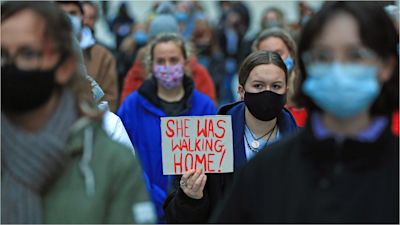Former chief constable calls on leaders to 'wake up' to threat of sexism in policing

Former chief constable says leaders must 'wake up' to the threat within policing
The criminal justice system is "inherently misogynistic in how its structured" a former chief constable has said.
Sue Fish, the ex-chief of Nottinghamshire Police, told ITV news "sexism" poses a "significant threat to our whole policing model".
She added: "Cultural challenges around misogyny are there throughout policing" as well as issues of "racism, transphobia, and homophobia".
Ms Fish was speaking after government ministers and Scotland Yard were accused of having a tone-deaf response to violence against women, in the wake of the sentencing of Wayne Couzens - a former Metropolitan Police officer.
It's emerged Couzens kidnapped Sarah Everard by carrying out a false arrest with his warrant card, before going on to rape and murder her.
The Metropolitan Police has come under fire in particular after suggesting those who feel unsafe around police flag down a bus or even call 999.
The handling of sexual misconduct allegations by police forces is "very inconsistent," Ms Fish said.
"Because it's widespread it's seen as normal in some parts, it's still not seen as exceptional.
ITV News Correspondent Dan Rivers hears from campaigners and a former police officer on the Met's reaction to Couzen's sentencing
"There is inherent sexism in policing - and indeed racism, transphobia, homophobia as well - there are aspects of police culture that are absolutely despicable and we've seen some of the extent of that in recent months."
Policing Minister Kit Malthouse said on Friday he hoped Couzens was just "one bad apple" but Ms Fish disagreed.
"It's definitely not one bad apple," she said.
"There are plenty of police officers who are fantastic and I think it's really important to say that. But the pervasive culture - and how that then manifests in terms of police officers abusing their partners, abusing colleagues and taking advantage and sexually abusing women - is surprisingly, I think for those outside of policing, commonplace.
"That's what has to be addressed. There has to be real rigour and insight and understanding of the issues in policing, particularly through misconduct processes, and there simply isn't that degree of insight as broadly as there should be."
What does leadership need to do?
Ms Fish called for police leaders and the government to "wake up" to the threat of sexism and misogyny within policing.
"It is so frustrating and it makes me so angry that so little understanding and insight is expressed by anyone in power," she said.
What has the Metropolitan Police's response been to the Couzens sentencing?
Met Police Commissioner Dame Cressida Dick said she recognised “the precious bond of trust has been damaged” and said Couzens had “brought shame on the Met”.
"There are no words that can fully express the fury and overwhelming sadness that we all feel about what happened to Sarah. I am so sorry," Dame Cressida said after the sentencing.
The Prime Minister said he still had confidence in the force and said the public could "trust" police.
But advice from the Met to anyone who is concerned a police officer is not acting legitimately during an interaction has been mocked.
The force recommended people ask where the officer’s colleagues are, where they have come from, why they are there, and exactly why they are stopping or talking to them.
'Question police,' say police
Police also suggest verifying the police officer by asking to hear their radio operator or asking to speak to the radio operator themselves.
"All officers will, of course, know about this case and will be expecting in an interaction like that – rare as it may be – that members of the public may be understandably concerned and more distrusting than they previously would have been, and should and will expect to be asked more questions," the force said in a statement.
As a final resort, the Met said people could shout out to a passer-by, run into a house, knock on a door, wave a bus down, or call 999.